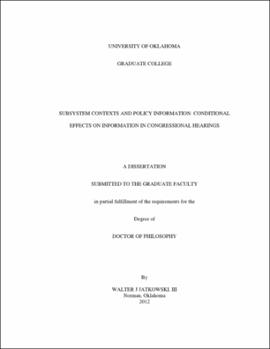| dc.contributor.advisor | Krutz, Glen S. | |
| dc.creator | III, Walt Jatkowski | |
| dc.date.accessioned | 2019-04-27T21:41:02Z | |
| dc.date.available | 2019-04-27T21:41:02Z | |
| dc.date.issued | 2012 | |
| dc.identifier | 9985434002042 | |
| dc.identifier.uri | https://hdl.handle.net/11244/319339 | |
| dc.description.abstract | While flows of policy information and the quest to acquire this information are generally accepted as important to the policymaking process (Krehbiel 1991; Sabatier and Jenkins-Smith 1993; Baumgartner and Jones 1993; Jones and Baumgartner 2005), the means by which this policy information is actually acquired by decision-makers has been relatively understudied in policy literature, to date. Within Congress, the hearing process provides an optimal opportunity for relevant policy information to be gathered and put on display. Yet, very little is known about the factors that drive policymakers to choose particular witnesses to testify at congressional hearings, and, in general, the purposes for which the congressional hearing process is utilized. | |
| dc.description.abstract | Utilizing my theory of information collection and display decisions, I attempt to answer the following general research question: what factors affect how congressional committees decide to utilize the congressional hearing process to collect and display information presented by witnesses? More specifically, I seek to understand the conditions that drive how subsystem contexts affect congressional policy makers' use of information collection and display strategies in each of the stages of the congressional hearing process including the selection of witnesses to testify at hearings, the presentation of information by the chosen witnesses, and the questioning of witnesses during the hearings. | |
| dc.description.abstract | Using original data collected from content analyses of committee member opening statements and witness testimony given during hearings in the policy areas of tobacco, biotechnology, and climate change, I study the institutional and political factors that determine the tone of testimony presented in congressional hearings. I find that the degree to which certain factors affect the tone of congressional testimony is affected by the issue area that the hearing is examining and in issues with multiple dimensions, the dimension of the issue being examined. When holding hearings on distributive issues that are likely to unite committee members, members of committees that are predisposed toward consensual politics will utilize the hearing process to collect and display information that bolsters the overall bias of the committee venue holding the hearing. When holding hearings on partisan issues that are likely to divide members of different parties within a committee venue, committee chairs utilize the hearing process to collect and display information that bolsters their own positions on the issue at hand. Finally, when holding hearings on new and technical issues that are likely to heighten uncertainty amongst members concerning the proper action to take on the issue, committees utilize the hearing process to collect expert and relatively neutral testimony that will help to reduce uncertainty amongst members on the proper policy actions to take. | |
| dc.format.extent | 454 pages | |
| dc.format.medium | application.pdf | |
| dc.language | en_US | |
| dc.relation.requires | Adobe Acrobat Reader | |
| dc.subject | Legislative hearings--United States | |
| dc.subject | Witnesses--United States | |
| dc.title | Subsystem Contexts and Policy Information: Conditional Effects on Information in Congressional Hearings | |
| dc.type | text | |
| dc.type | document | |
| dc.thesis.degree | Ph.D. | |
| ou.group | College of Arts and Sciences::Department of Political Science | |
